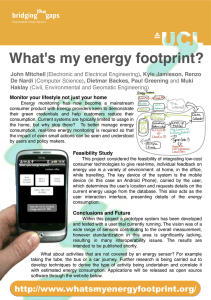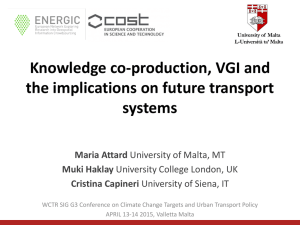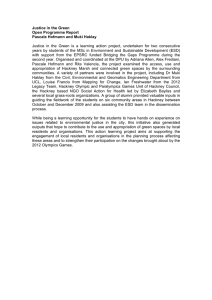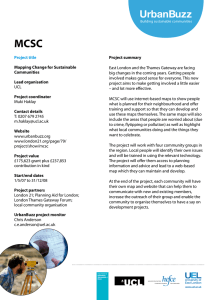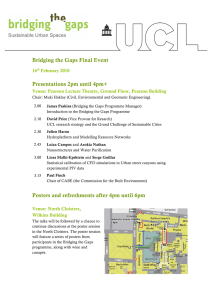Presentation by Dr. Rina Ghose, University of Wisconsin- Milwaukee
advertisement
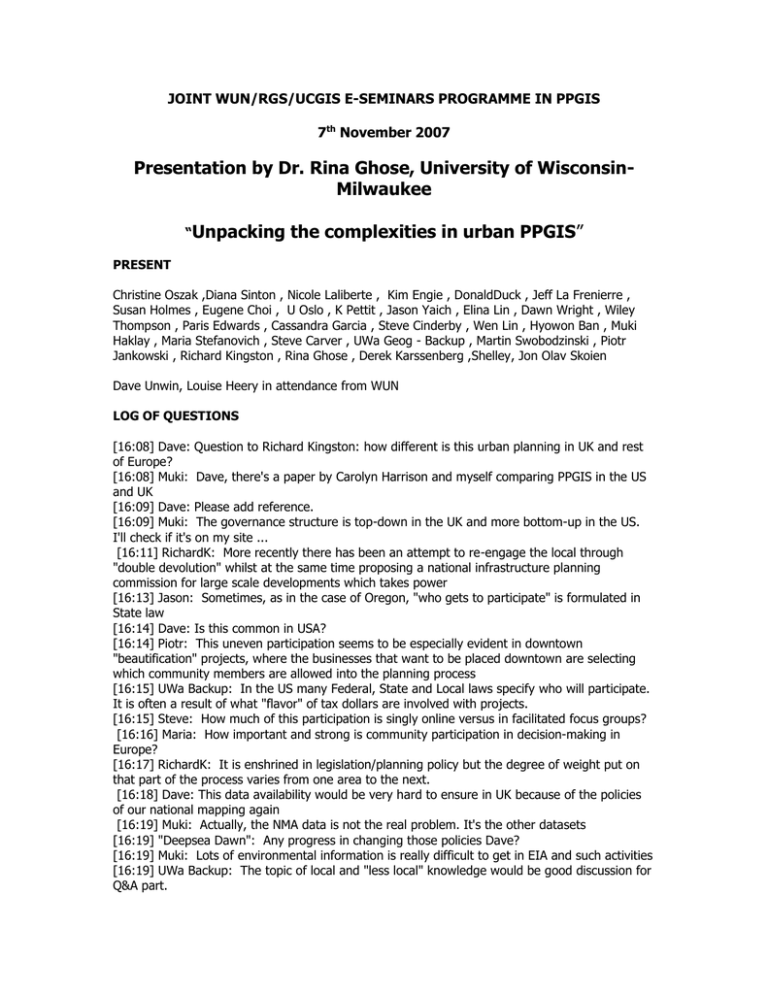
JOINT WUN/RGS/UCGIS E-SEMINARS PROGRAMME IN PPGIS 7th November 2007 Presentation by Dr. Rina Ghose, University of WisconsinMilwaukee “Unpacking the complexities in urban PPGIS” PRESENT Christine Oszak ,Diana Sinton , Nicole Laliberte , Kim Engie , DonaldDuck , Jeff La Frenierre , Susan Holmes , Eugene Choi , U Oslo , K Pettit , Jason Yaich , Elina Lin , Dawn Wright , Wiley Thompson , Paris Edwards , Cassandra Garcia , Steve Cinderby , Wen Lin , Hyowon Ban , Muki Haklay , Maria Stefanovich , Steve Carver , UWa Geog - Backup , Martin Swobodzinski , Piotr Jankowski , Richard Kingston , Rina Ghose , Derek Karssenberg ,Shelley, Jon Olav Skoien Dave Unwin, Louise Heery in attendance from WUN LOG OF QUESTIONS [16:08] Dave: Question to Richard Kingston: how different is this urban planning in UK and rest of Europe? [16:08] Muki: Dave, there's a paper by Carolyn Harrison and myself comparing PPGIS in the US and UK [16:09] Dave: Please add reference. [16:09] Muki: The governance structure is top-down in the UK and more bottom-up in the US. I'll check if it's on my site ... [16:11] RichardK: More recently there has been an attempt to re-engage the local through "double devolution" whilst at the same time proposing a national infrastructure planning commission for large scale developments which takes power [16:13] Jason: Sometimes, as in the case of Oregon, "who gets to participate" is formulated in State law [16:14] Dave: Is this common in USA? [16:14] Piotr: This uneven participation seems to be especially evident in downtown "beautification" projects, where the businesses that want to be placed downtown are selecting which community members are allowed into the planning process [16:15] UWa Backup: In the US many Federal, State and Local laws specify who will participate. It is often a result of what "flavor" of tax dollars are involved with projects. [16:15] Steve: How much of this participation is singly online versus in facilitated focus groups? [16:16] Maria: How important and strong is community participation in decision-making in Europe? [16:17] RichardK: It is enshrined in legislation/planning policy but the degree of weight put on that part of the process varies from one area to the next. [16:18] Dave: This data availability would be very hard to ensure in UK because of the policies of our national mapping again [16:19] Muki: Actually, the NMA data is not the real problem. It's the other datasets [16:19] "Deepsea Dawn": Any progress in changing those policies Dave? [16:19] Muki: Lots of environmental information is really difficult to get in EIA and such activities [16:19] UWa Backup: The topic of local and "less local" knowledge would be good discussion for Q&A part. [16:19] Dave: Not yet -- but see Muki Haklay's comment [16:19] Muki: Lots of environmental information is really difficult to get in EIA and such activities [16:19] UWa Backup: The topic of local and "less local" knowledge would be good discussion for Q&A part. [16:19] Dave: Not yet -- but see Muki Haklay's comment [16:19] Paris: where does PPGIS fall on the "hierarchy of needs"? Do those with the greatest need get to participate? [16:20] Steve: Again, perhaps the only way to ensure representative use is through facilitated focus groups? Time consuming but more robust. [16:20] Muki: The OS is going to release a Google maps like interface by the end of the year. [16:20] Muki: BTW, my paper is available at http://homepages.ge.ucl.ac.uk/~mhaklay/pdf/PPGIS-UKUS.doc [16:20] RichardK: Muki I agree although mapping census data is problematic due to our NMA claiming copyright on the digital boundaries as you well know. [16:20] RichardK: Muki I agree although mapping census data is problematic due to our NMA claiming copyright on the digital boundaries as you well know. [16:22] Muki: I agree Richard, but NMAs are easy target when access to data is difficult even when it's out. For example, the Environment Agency pollution inventory is totally useless - and I've tried it on 6-10 communities [16:22] Dave: Do we in UK have any examples of University/Community collaboration/partnership in this context? [16:22] Muki: Yes. I'm working with London 21 in London on a project right now - the green map for London [16:22] Muki: And another project on community mapping [16:22] Steve: I'll be talking about such an example in Montana in my seminar in a few weeks time [16:23] Muki: London 21 is a charity that is leading sustainability activities in London [16:23] RichardK: And I'm just starting the coastal project but is covering the NW region rather than a neighborhood. [16:24] Dave: are these examples all voluntary or on a paid basis? [16:25] Muki: In my case, we've got joint funding, but than we're working with 4 communities and many groups in each area that are doing it on voluntary basis. I've been working with L21 on voluntary basis for 4 years. [16:26] RichardK: Mine is Environment. Agency/DEFRA funded [16:26] SteveC: In what way superior to the public data? [16:26] Steve: Mine is USDA Forest Service funded [16:26] SteveC: In what way superior to the public data? [16:26] Steve: Mine is USDA Forest Service funded [16:28] Dave: are ANY thematic maps 'simple'? [16:29] Steve: True enough. What about aerial imagery? [16:29] UWa Backup: Based on the maps presented in this talk, what is a simple map and what is a complex map - please overview [16:29] Jason: Does Wisconsin have a State-mandated planning program with a public participation component, or does public participation in Wisconsin occur as per local codes & policies ? 16:30] RichardK: Question: Do you face data protection issues at the neighborhood scale? [16:31] Muki: Sorry to bang on about usability - but isn't it all because GIS is so hard to use? [16:31] pathfinder: what's the spatial extent of neighborhood? how large is it? [16:31] Steve: Question: neighborhoods are "places" as opposed to "spaces" have you looked at alternative data models to capture this? [16:32] Tyler B.: Is there any effort to create an online GIS tutorial for specific community based users? [16:32] Jason: Interestingly the same COs that want access to GIS technology are the same organizations that oppose tax increases to fund support of GIS (go figure) [16:33] "Deepsea Dawn": Amen! [16:35] SteveC: How do you ensure the whole community is participating equally - can this community PPGIS be derailed by powerful community actors? [16:36] Steve: Question: can community representatives answer the above question? [16:36] Jason: (a) you can't, and (b) yes [16:36] Muki: Do we want to engage the community as individuals, or do we want to give more voice to established organizations which already exist? [16:37] SteveC: I think it depends whether this engages with what local government officers call the 'hard to reach groups' [16:38] Jason: If we wanted to objectively think that individuals have as much expertise as established local organizations, it would still be difficult for decision makers to give more weight to the individual's input [16:40] RichardK: There is a real problem in all of this with the individual view and the 'community' view. A key issue is how to reach consensus through PPGIS? [16:40] Jason: Ah, you've touched on the fundamental flaw of representative democracy [16:41] Steve: plus most people hold both a community view and a different personal view depending on the context/company in which you talk to them [16:41] RichardK: Yep - I'm not sure PPGIS can solve this one.... [16:41] SteveC: Exactly - for some issues there will never be consensus [16:41] Steve: Indeed, but that's half the fun of it all! [16:41] Muki: And there's also here a UK/US difference - in the US, consensus building seem to be important, whereas in the UK the deliberation is valuable. So there's also differences in the process because of cultural difference [16:43] Eugene: In that case, even PPGIS can't solve this problem, is there any chance to visualize those different views and informations? [16:43] Muki: yes, there's the concept of ‘argumaps’ that visualizes the different views [16:43] RichardK: Always remember that PPGIS is a form of decision SUPPORT system not decision TAKING system [16:43] Eugene: In that case, even PPGIS can't solve this problem, is there any chance to visualize those different views and informations? [16:44] DonaldDuck: what about the participation of the communities next to a regeneration scheme. Some of the effects of these scheme are realized in nearby communities that are excluded from the regeneration scheme. Social problems, like antisocial behaviour etc, are being ‘remoted’ to nearby places. [16:45] SteveC: Or with regeneration schemes - you may need the potential new residents for the community to participate [16:52] Paris: what about environmental justice issues? Do you find that communities recognize these issues, or are they more regularly identified by universities/lead organizations? [16:53] Muki: In the UK, EJ is very much lead organization who raise it. We're running a project right now and communities find it very difficult issue to engage with. It's interested to compare that to the US [16:52] Paris: what about environmental justice issues? Do you find that communities recognize these issues, or are they more regularly identified by universities/lead organizations? [16:53] Muki: In the UK, EJ is very much lead organisation who raise it. We're running a project right now and communities find it very difficult issue to engage with. It's interested to compare that to the US [16:55] SteveC: Muki - can you send me some details on this activity [16:55] Maria: Muki, are you aware of any comparative projects that work on similar issues in both countries? [16:56] Muki: No, I don't know - and I would love to work on someone that can help me with comparing the cases. Steve - again, it's with London 21 so if you look at http://www.london21.org/page/79/project/show/env_ineq [16:56] Muki: We've done 2 communities already and engaging with a third very soon. [16:57] SteveC: Thanks Muki [16:57] Muki: We hope to write up a report on this early next year. [16:58] SteveC: Great - can you send me a copy when you have it? [16:58] Muki: Sure. So far, it's very very difficult to even convince communities to get out of their area to do comparative mapping ... [16:56] Muki: No, I don't know - and I would love to work on someone that can help me with comparing the cases. Steve - again, it's with London 21 so if you look at http://www.london21.org/page/79/project/show/env_ineq [16:56] Muki: We've done 2 communities already and engaging with a third very soon. [16:57] Muki: We hope to write up a report on this early next year. [16:58] Muki: Sure. So far, it's very very difficult to even convince communities to get out of their area to do comparative mapping ... [17:00] Maria: Is it because they don't see any benefit from it? Log created by Dave Unwin
